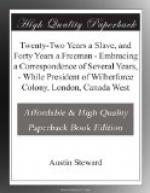We were about to leave the land of our birth, the home of our childhood, and we felt that untried scenes were before us. We were slaves, it is true, but we had heart-felt emotions to suppress, when we thought of leaving all that was so familiar to us, and chose rather to “bear the ills we had, than to fly to those we knew not of.” And oh, the terrible uncertainty of the future, that ever rests on the slave, even the most favored, was now felt with a crushing weight. To-day, they are in the old familiar cabin surrounded by their family, relatives and friends; to-morrow, they may be scattered, parted forever. The master’s circumstances, not their own, may have assigned one to the dreadful slave-pen, and another to the distant rice-swamp; and it is this continual dread of some perilous future that holds in check every joyous emotion, every lofty aspiration, of the most favored slave at the South. They know that their owners indulge in high living, and they are well aware also that their continual indulgences engender disease, which make them very liable to sudden death; or their master may be killed in a duel, or at a horse-race, or in a drunken brawl; then his creditors are active in looking after the estate; and next, the blow of the auctioneer’s hammer separates them perhaps for life.
Now, after the lapse of so many years, when my thoughts wander back, as they often do, to my native State, I confess that painful recollections drive from my mind those joyful emotions that should ever arise in the heart of man, when contemplating the familiar scenes of his youth, and especially when recurring to the venerable shades and the sheltering roof under which he was born. True, around the well-remembered spot where our childhood’s years were spent, recollection still loves to linger; yet memory, ever ready with its garnered store, paints in glowing colors, Virginia’s crouching slaves in the foreground. Her loathsome slave-pens and slave markets—chains, whips and instruments of torture; and back of all this is as truthfully recorded the certain doom, the retributive justice, that will sooner or later overtake her; and with a despairing sigh I turn away from the imaginary view of my native State.
What though she may have been justly styled, “The Mother of Presidents?” What avails the honor of being the birth-place of the brave and excellent Washington, while the prayers and groans of the down-trodden African daily ascend to heaven for redress? What though her soil be fertile, yielding a yearly product of wealth to its possessors? And what matter is it, that their lordly mansions are embowered in the shade of trees of a century’s growth, if, through their lofty and tangled branches, we espy the rough cabin of the mangled bondman, and know that the soil on which he labors has drunk his heart’s blood?
Ah! to me, life’s sweetest memories are all embittered. Slavery had cast its dark and fearful shadow over my childhood, youth, and early manhood, and I went out from the land of my birth, a fettered slave. A land which I can regard only as “the house of bondage and the grave of freedom.” But God forgive me for having envied my master his fair prospects at this time.




